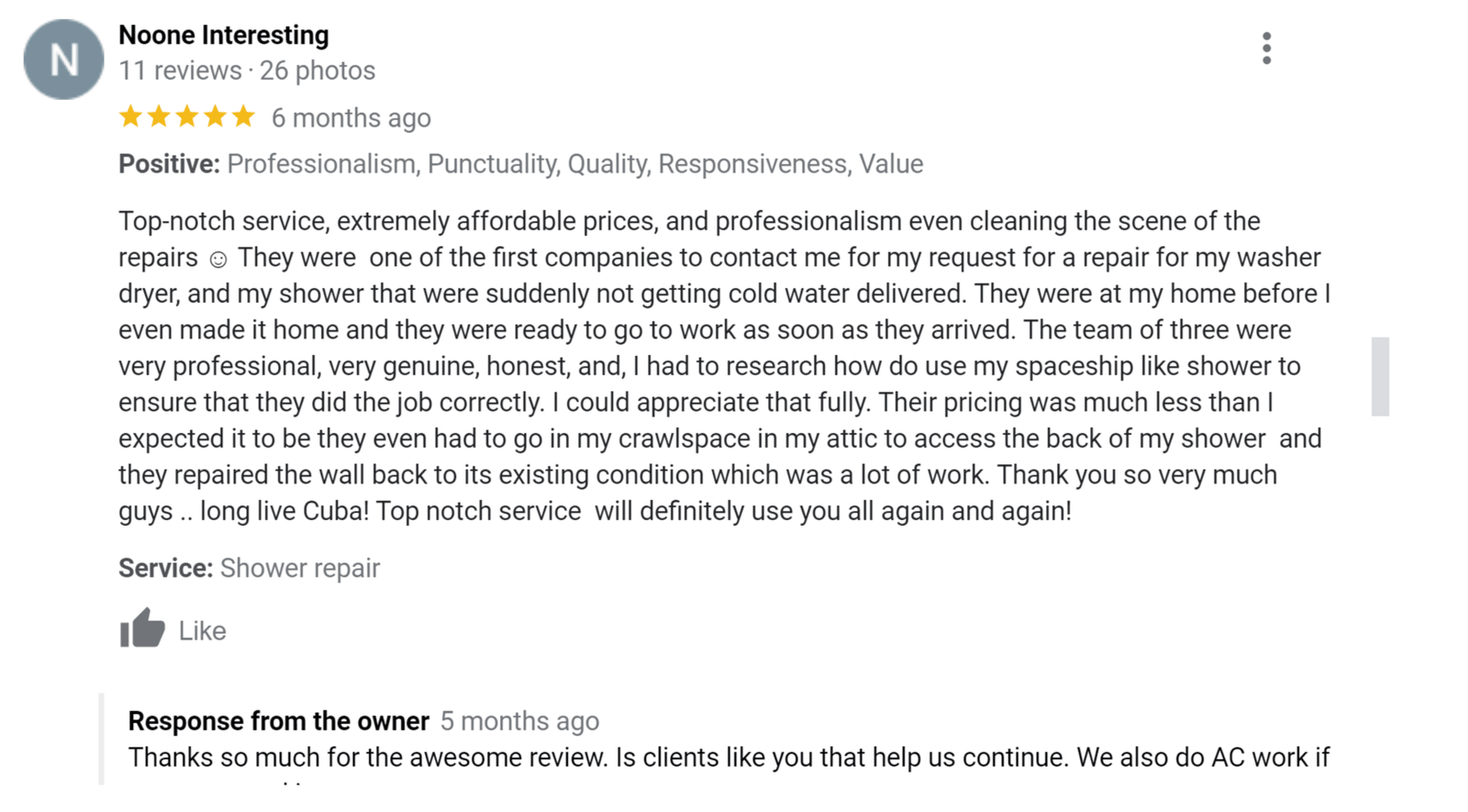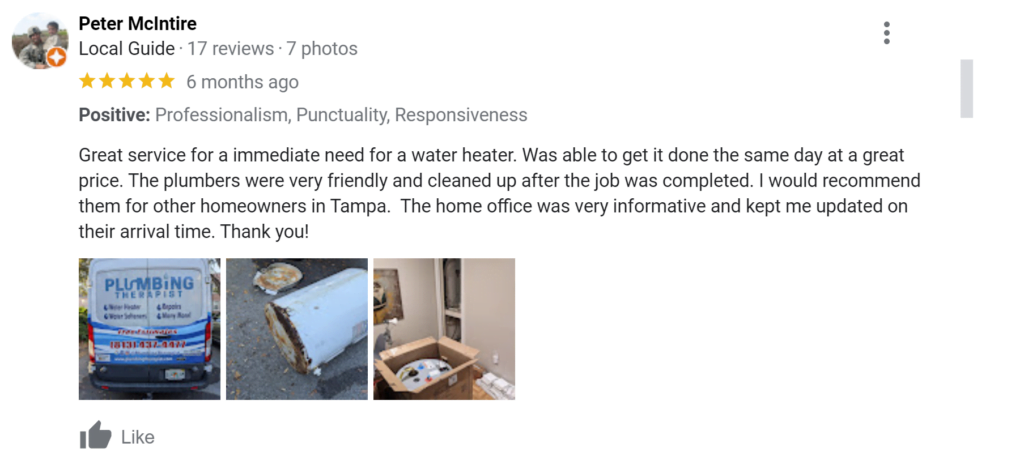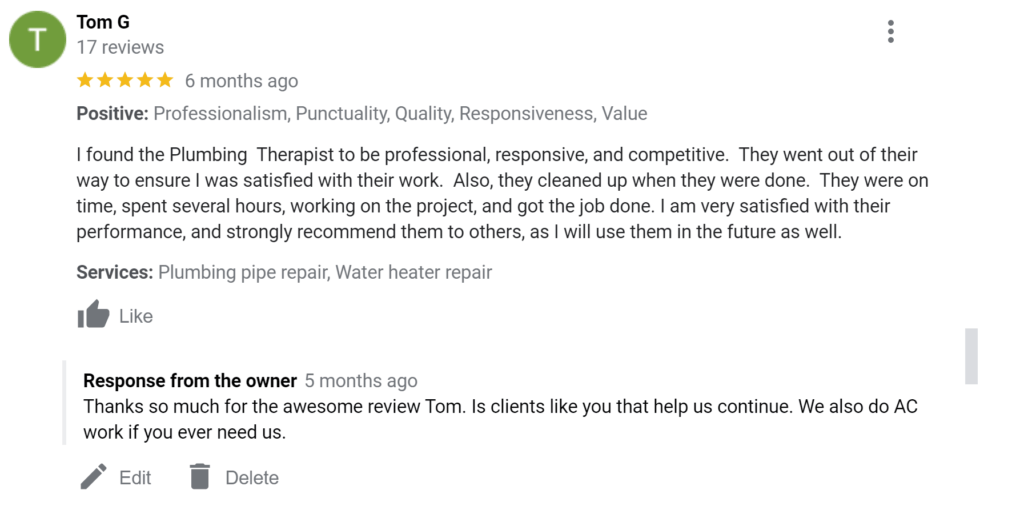Water Heater
A water heater is an essential appliance in any home or commercial space that heats and stores water for various domestic and industrial purposes. It plays a crucial role in providing hot water for bathing, cleaning, cooking, and space heating.
Do You Need Our Help ?
Feel free to contact us now
$99 Water Heater Flush + Free Plumbing System Inspection
Water Heater in Tampa Bay
Reliable Water Heater Solutions for Your Comfort in Hillsborough County, Pinellas County, and Pasco County
At Plumbing Therapist, we understand that hot water is not just a luxury; it’s a necessity. Your water heater is the unsung hero of your home, providing warmth for your showers, clean dishes, and more. Let’s dive into what a water heater is, our specialized plumbing services, and why choosing us is the best decision for your hot water needs.
What Is a Water Heater?
A water heater is a vital appliance that heats and stores water for various domestic purposes. It ensures you have access to hot water whenever you need it, enhancing your daily comfort and convenience. Whether you have a traditional tank-style water heater or an energy-efficient tankless model, our experts are well-equipped to handle them all.
Our Specialized Plumbing Services
At Plumbing Therapist, we offer a comprehensive range of water heater services to keep your hot water flowing smoothly:
Water Heater Installation: Our skilled technicians can expertly install a new water heater in your home, tailored to your specific needs and preferences.
Water Heater Repair: Is your water heater acting up? Our team is adept at diagnosing and fixing issues promptly to restore your hot water supply.
Water Heater Maintenance: Regular maintenance is crucial to ensure your water heater’s longevity and efficiency. Trust us to keep your system in optimal condition.
Why Choose Plumbing Therapist?
Expertise: Our team consists of licensed and experienced plumbers who are well-versed in all aspects of water heater service. We stay updated on the latest industry trends and technologies to provide you with the best solutions.
Quality Assurance: We work with trusted brands and high-quality water heater systems to ensure longevity and efficiency. Our installations are done to the highest standards.
Timely Service: We understand that a malfunctioning water heater can disrupt your daily routine. That’s why we prioritize timely service to get your hot water flowing again as quickly as possible.
Transparent Pricing: You’ll receive a clear and competitive estimate before any work begins. We believe in transparent pricing with no hidden fees.
Customer Satisfaction: Your satisfaction is our top priority. We’re committed to providing exceptional service and ensuring that you have access to hot water whenever you need it.
Trust Plumbing Therapist to be your go-to experts for all your water heater needs. We combine expertise, quality, and customer-centric service to ensure that your hot water remains reliable and efficient. Say goodbye to cold showers and hello to uninterrupted warmth.
Don’t wait, contact us today to schedule an appointment or learn more about our water heater services. We’re here to keep your home comfortably supplied with hot water, day in and day out.

Why partner with Plumbing Therapist?
Quality, Affordability, and Expertise.

No Hidden or Unexpected Charges

Free Estimates & Online Booking Available

Professionally Trained Technicians

Honesty is Guaranteed

Quick Communication & Service Within 24 Hours

400+ 5 Star Reviews

Why do you need a Water Heater?
You need a water heater because it plays a crucial role in providing hot water for various household tasks. As a plumbing company, we’ll explain why a water heater is essential:
Hot Water Supply: A water heater ensures you have a steady supply of hot water for daily activities such as bathing, washing dishes, and doing laundry. It adds comfort and convenience to your daily routine.
Sanitation: Hot water is essential for maintaining good hygiene. It helps in killing bacteria and germs, making it important for cleaning and sanitizing.
Energy Efficiency: Modern water heaters are designed to be energy-efficient, which can save you money on your utility bills over time. They heat water only when needed, reducing energy wastage.
Home Value: Having a functional water heater can increase the value of your home. Prospective buyers often consider the quality and efficiency of water heating systems when purchasing a property.
Safety: Properly installed and maintained water heaters are safe to use. They have safety features to prevent overheating and accidents.
Comfort: Hot water is essential for a comfortable living environment, especially in colder seasons. It ensures that you and your family can enjoy warm showers and a cozy home.
Versatility: Water heaters come in different types, including tankless, tank-style, and heat pump water heaters. This allows you to choose the one that best suits your needs and space.
If you would like more information, feel free to give them a call at (813)-437-4477 or you can book online and get their latest discount!
Customer Testimonials: Real Experiences with Plumbing Therapist
We proudly share the experiences and stories of our valued clients. Their feedback provides a glimpse into the quality of service and commitment to excellence we uphold at Plumbing Therapist. You'll read firsthand how our plumbing solutions have improved comfort and efficiency in homes across Tampa Bay. These testimonials illustrate our dedication to customer satisfaction and the difference our expert services can make.




Your questions answered
Common Water Heater Questions:
What type of water heater is best for my home?
The choice of the best water heater for your home depends on several factors, including your hot water usage, available space, budget, and energy efficiency preferences. Here are some common types of water heaters and their suitability for different situations:
Tankless Water Heater (On-Demand):
- Suitability: Ideal for homes with limited space or where hot water demand is sporadic.
- Advantages: Energy-efficient, space-saving, and provides hot water on-demand.
- Considerations: Initial cost may be higher, and it requires a dedicated gas or electrical connection.
Tank-Style Water Heater:
- Suitability: Suitable for homes with moderate to high hot water usage.
- Advantages: Lower initial cost, simple installation, and available in various sizes.
- Considerations: May have higher energy costs and a limited hot water supply.
Heat Pump Water Heater:
- Suitability: Good for energy-conscious homeowners with space for installation.
- Advantages: Highly energy-efficient, can save on energy bills, and can also cool the surrounding air.
- Considerations: Initial cost is higher, and it works best in warmer climates.
Solar Water Heater:
- Suitability: Ideal for sunny regions with a commitment to sustainability.
- Advantages: Utilizes renewable energy, reduces energy bills, and has a long lifespan.
- Considerations: High upfront costs, and backup heating may be required in cloudy weather.
Hybrid Water Heater:
- Suitability: Suitable for homes with moderate hot water needs.
- Advantages: Energy-efficient, combines heat pump and tank technologies, and reduces energy costs.
- Considerations: Higher upfront cost and requires space for installation.
Propane or Natural Gas Water Heater:
- Suitability: Suitable for homes with a natural gas or propane supply.
- Advantages: Efficient and cost-effective operation for homes with gas connections.
- Considerations: Installation requires proper venting and gas lines.
Electric Resistance Water Heater:
- Suitability: Common for homes without access to natural gas or propane.
- Advantages: Lower upfront cost compared to some alternatives.
- Considerations: Can be less energy-efficient than other options, resulting in higher operational costs.
To determine the best water heater for your home, consider factors such as your hot water needs, available space, budget, and environmental preferences. It’s also a good idea to consult with a professional plumber or HVAC technician who can assess your specific situation and recommend the most suitable water heater for your needs.
How often should I flush my water heater?
Flushing your water heater is an essential maintenance task that helps remove sediment buildup and maintain its efficiency. The frequency of flushing your water heater can vary depending on the hardness of your water supply and the type of water heater you have. Here are some general guidelines:
Annual Flushing: For most households, an annual flush is a good rule of thumb. This helps prevent sediment buildup from reducing the efficiency of your water heater and extends its lifespan.
Bi-Annual Flushing: If you live in an area with particularly hard water or if you notice a significant amount of sediment buildup during your annual flush, consider flushing your water heater every six months.
Tankless Water Heaters: Tankless water heaters typically require less frequent maintenance. It’s often recommended to flush them every 1-2 years, but consult your manufacturer’s guidelines for specific recommendations.
Here’s how to flush your water heater:
Note: Before attempting to flush your water heater, turn off the power supply (electricity or gas) and shut off the cold water supply to the heater.
Connect a garden hose to the drain valve at the bottom of the tank.
Place the other end of the hose in a floor drain, utility sink, or outdoors where hot water won’t cause damage.
Open a hot water faucet in your home to allow air into the system, which will help with draining.
Open the drain valve on the water heater and let the water flow out. Be cautious as the water will be hot.
Once the water runs clear and free of sediment, close the drain valve.
Turn on the cold water supply to the tank to fill it back up.
Once the tank is full, turn on the power supply (electricity or gas) and relight the pilot if necessary.
Remember to always follow the manufacturer’s instructions for your specific water heater model, as the procedure may vary slightly.
Regularly flushing your water heater helps maintain its efficiency, prevents potential issues, and extends its lifespan. If you’re not comfortable performing this maintenance yourself, consider hiring a professional plumber to do it for you.
What is the average lifespan of a water heater?
The average lifespan of a water heater can vary depending on factors such as the type of water heater, water quality, maintenance, and usage patterns. Here are some general guidelines for the expected lifespans of different types of water heaters:
Tankless Water Heater (On-Demand): Tankless water heaters typically have a longer lifespan compared to tank-style heaters. On average, they can last 20-25 years or more with proper maintenance.
Tank-Style Water Heater: Traditional tank-style water heaters have an average lifespan of around 10-15 years. However, regular maintenance, such as flushing to remove sediment buildup, can extend their life.
Heat Pump Water Heater: Heat pump water heaters can last between 10-15 years with proper maintenance. Their lifespan may vary depending on factors like climate and usage.
Solar Water Heater: Solar water heaters have a relatively long lifespan, often lasting 20-30 years or more. Proper maintenance and care are essential for maximizing their longevity.
Hybrid Water Heater: Hybrid water heaters typically have a lifespan of 10-15 years. Regular maintenance helps ensure they reach the upper end of their lifespan range.
Propane or Natural Gas Water Heater: Gas water heaters usually last around 10-12 years with proper care and maintenance.
Electric Resistance Water Heater: Electric water heaters have a similar lifespan to gas heaters, averaging around 10-12 years.
It’s important to note that water heaters can fail prematurely if they are not properly maintained or if they experience unusual wear and tear. Regular maintenance tasks, such as flushing to remove sediment, checking and replacing sacrificial anode rods, and addressing any leaks or issues promptly, can significantly extend the life of your water heater.
Additionally, water quality plays a role in a water heater’s lifespan. Hard water with a high mineral content can lead to more rapid sediment buildup and corrosion, potentially shortening the heater’s life.
To maximize the lifespan of your water heater and ensure it operates efficiently, it’s a good practice to schedule regular maintenance and inspections by a professional plumber or HVAC technician. They can identify and address any issues early, helping you get the most out of your water heater investment.
How can I increase the efficiency of my water heater?
Increasing the efficiency of your water heater can help reduce energy consumption and lower your utility bills. Here are several ways to improve the efficiency of your water heater:
Lower the Thermostat Temperature:
- Most water heaters have adjustable thermostats. Lowering the temperature to around 120°F (49°C) can help reduce energy consumption without sacrificing comfort.
Insulate Hot Water Pipes:
- Insulating the hot water pipes in your home can help maintain hot water temperature as it travels from the heater to your faucets. This reduces the need to reheat water.
Insulate the Water Heater Tank:
- If your water heater is not already insulated, consider adding an insulation blanket or jacket. This reduces heat loss from the tank, especially if it’s located in a cold area like a basement.
Regular Maintenance:
- Schedule annual maintenance for your water heater, including flushing to remove sediment buildup. Sediment can reduce the heater’s efficiency.
Install Low-Flow Fixtures:
- Low-flow faucets and showerheads reduce the amount of hot water you use, which can result in energy savings.
Fix Leaks and Drips:
- Address any leaks or drips promptly. A leaking faucet or pipe can waste hot water, increasing your energy consumption.
Install a Timer or Smart Thermostat:
- Use a timer or a smart thermostat to schedule the water heater to operate during times when hot water is needed, reducing standby heat loss during unused periods.
Consider a Tankless Water Heater:
- Tankless water heaters, also known as on-demand heaters, are highly efficient because they only heat water when you need it. They can be a cost-effective option in the long run.
Use Cold Water for Laundry:
- When doing laundry, use cold water whenever possible. Washing clothes with hot water consumes a significant amount of energy.
Install a Heat Trap:
- Heat traps prevent heat loss through the pipes connected to the water heater. They can be installed on the hot and cold water pipes near the heater.
Upgrade to a High-Efficiency Unit:
- If your water heater is old and inefficient, consider upgrading to a newer, high-efficiency model. Look for the ENERGY STAR label for energy-efficient options.
Reduce Water Heater Size:
- If your household has reduced hot water needs, you may be able to switch to a smaller water heater, which can save energy and reduce standby heat loss.
By implementing these energy-saving measures, you can increase the efficiency of your water heater, reduce energy consumption, and lower your utility bills while still enjoying a reliable supply of hot water.
Is it better to repair or replace my old water heater?
Deciding whether to repair or replace your old water heater depends on several factors, including the age of the unit, the nature of the problem, and your long-term goals. Here are some guidelines to help you make an informed decision:
Repair Your Water Heater If:
Age: If your water heater is relatively young (less than 8-10 years old for tank-style units), and the repair is minor or can address a specific issue, it may be cost-effective to repair it.
Warranty: If your water heater is still under warranty, the repair cost may be significantly reduced or covered entirely by the manufacturer. Check the warranty terms before making a decision.
Minor Issues: If the problem is a minor component replacement, such as a faulty thermostat or pressure relief valve, repairing is often the more economical choice.
Budget Constraints: If you’re on a tight budget and the repair cost is reasonable, it may be more practical to opt for a repair rather than a replacement.
Sustainability: Repairing an existing water heater is a more sustainable option compared to replacing it, as it reduces waste and the environmental impact of manufacturing new units.
Consider Replacing Your Water Heater If:
Age: If your water heater is nearing the end of its expected lifespan (usually 10-15 years for tank-style heaters), it may be more cost-effective in the long run to replace it, especially if it has a history of frequent repairs.
Major Issues: If the water heater has a major issue such as a leaking tank, severe corrosion, or a failing heat exchanger (for tankless units), replacement is often the best course of action.
Inefficiency: Older water heaters tend to be less energy-efficient. If you’re experiencing rising energy bills or want to reduce energy consumption, upgrading to a more efficient unit may be a wise choice.
Safety Concerns: If the water heater poses safety risks due to issues like gas leaks or pressure problems, it’s essential to prioritize safety and replace the unit.
Long-Term Savings: Investing in a new, energy-efficient water heater can result in long-term savings on your energy bills and potentially reduce the need for future repairs.
Changing Needs: If your household’s hot water needs have changed (e.g., a growing family), consider replacing your water heater with a larger capacity unit or a more suitable type.
Tax Credits and Rebates: Investigate if there are any local or federal incentives, tax credits, or rebates for upgrading to a more energy-efficient water heater. These can offset the initial cost of replacement.

